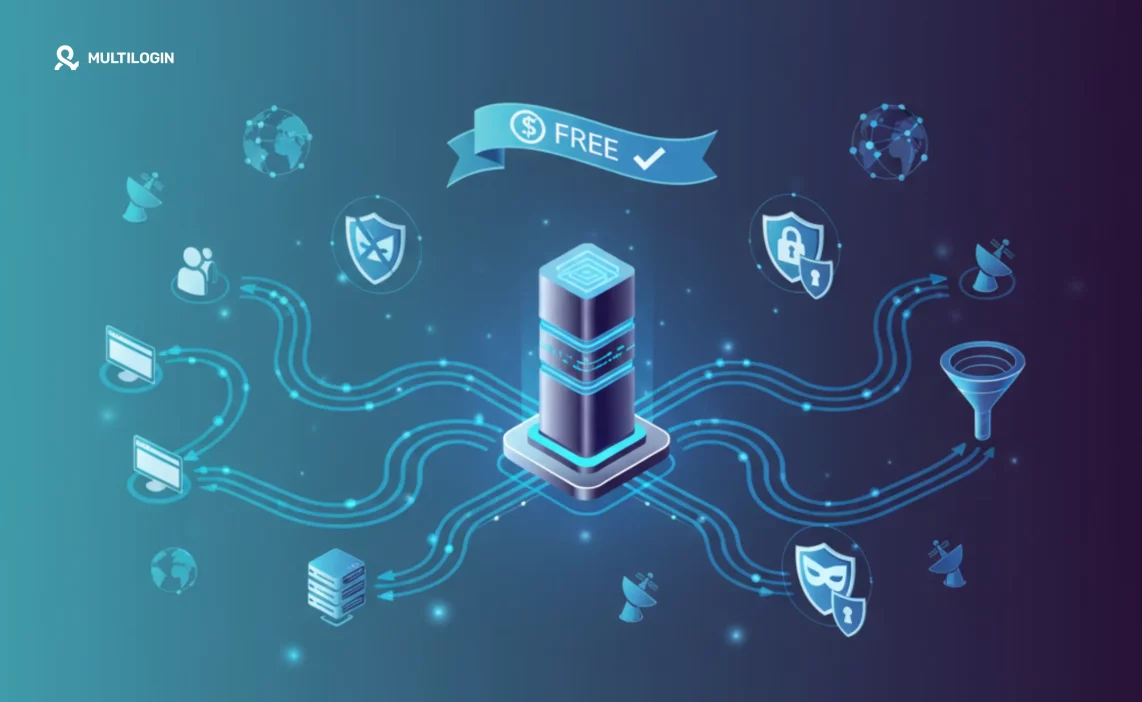You need to access a blocked website or manage a second social media account, so you search for a “free web proxy.” You find a site, paste in a URL, and it works. Problem solved, right? Wrong.
Using a free web proxy in 2026 is one of the fastest ways to get your accounts banned, your data stolen, and your devices infected with malware. These services, promising free anonymity, are a minefield of security risks and performance issues. They are the digital equivalent of finding a used, unlabeled key on the street and using it to lock your house.
In this essential 2026 guide, we pull back the curtain on the free web proxy industry. We’ll expose the hidden dangers that providers don’t advertise, explain why they are completely unsuitable for any serious business task, and show you what professionals use instead for secure, undetectable multi-account management.
Don’t risk your accounts on free tools. Multilogin provides enterprise-grade security with integrated residential proxies, making you truly anonymous and undetectable. Try Multilogin now →
What is a Free Web Proxy and How Does It Supposedly Work?
A web proxy is a proxy server that acts as an intermediary between your computer and the internet. When you send a request to a website, it first goes to the proxy server, which then forwards it to the website. The website sees the proxy’s IP address, not yours.
A free web proxy is simply a service that offers this functionality at no cost. Typically, these are browser-based tools where you enter a URL to access a site through their server.
On the surface, the benefits seem clear:
- Anonymity: Hides your real IP address
- Access Geo-Restricted Content: Bypass regional blocks
- Unblock Websites: Get around school or workplace firewalls
- No Cost: It’s free
But this is where the illusion of a free lunch ends. The business model of free proxies is built on monetizing your data and activity, creating a long list of dangers you are exposed to.
The Hidden Dangers: Why 99% of Free Proxies Are Unsafe
Running a proxy server costs money—for bandwidth, hardware, and maintenance. If you’re not paying for the product, you are the product. Here are the most common ways free proxy providers monetize your usage, and the risks they pose.
1. Data Logging and Selling
This is the most significant risk. Free proxy providers have a complete, unencrypted view of all the traffic you send through them. They can and do log:
- Every website you visit
- Usernames and passwords you enter
- Personal information you fill into forms
- Cookies and session data
They then sell this valuable data to third parties: advertisers, data brokers, and sometimes even malicious actors. By using a free proxy, you are handing over your entire digital life to an unknown entity, compromising your online anonymity.
2. Malware and Ad Injection
Many free proxies modify the web pages you visit to inject their own content. This can include:
- Intrusive Ads: They replace the website’s ads with their own, often leading to spammy or malicious sites
- Malware & Spyware: They can inject malicious scripts into your browser through script injection to install malware, keyloggers, or spyware on your device
- Cryptocurrency Miners: Some proxies will use your computer’s CPU to mine cryptocurrency without your consent, slowing down your device and increasing your electricity bill
3. No Encryption (HTTP vs. HTTPS)
A huge number of free proxies only support basic HTTP traffic. This means your connection to the proxy server is not encrypted. Anyone on the same network (e.g., a public Wi-Fi hotspot) can intercept your data, including login credentials and personal messages.
Even if a proxy supports SSL/HTTPS, they can perform a “man-in-the-middle” attack by decrypting your traffic, inspecting it, and then re-encrypting it before sending it to the destination. You have no guarantee of end-to-end security or proper secure browsing.
4. Shared, Blacklisted IPs
Free proxies recycle the same small pool of IP addresses across thousands of users. These IPs are:
- Instantly Recognizable: Websites like Google, Facebook, and Amazon maintain lists of known proxy IPs through IP blacklisting. Using one is an immediate red flag
- Blacklisted: They are often already banned from major platforms due to abuse by previous users
- “Bad Neighborhood”: Your activity gets associated with all the other (often illicit) activities performed from that same IP address, damaging your IP reputation
Using a free proxy for managing a business account is like showing up to a bank meeting with a fake ID that has been used in ten prior robberies. You will be blocked on sight.
5. Abysmal Performance and Reliability
Free proxies are notoriously slow and unreliable:
- Overcrowded Servers: Thousands of users share the same limited bandwidth, leading to constant buffering and slow page loads
- No Uptime Guarantee: Servers can go down at any moment, interrupting your work and potentially losing data
- Download and Streaming Limits: Most free proxies have strict limits on file sizes and block video streaming entirely
Feature | Free Web Proxy | Professional Solution (Multilogin) |
Security | ❌ None (Data logging, malware risk) | ✅ Enterprise-Grade Encryption |
IP Quality | ❌ Shared, Blacklisted Datacenter IPs | ✅ Clean, Private Residential IPs |
Anonymity | ❌ Easily Detected | ✅ Undetectable Fingerprints |
Performance | ❌ Slow, Unreliable | ✅ High-Speed, Stable Connections |
Support | ❌ None | ✅ 24/7 Expert Support |
Cost | “Free” (You are the product) | Transparent, Affordable Plans |
Why Free Proxies Are Useless for Business & Multi-Accounting
If you’re just trying to watch a geo-blocked YouTube video, a free proxy might (slowly) work, though it’s still risky. But for any professional use case, they are completely useless and counterproductive.
- Multi-Account Management: Trying to manage multiple Facebook, Amazon, or TikTok accounts on a free proxy is a guaranteed recipe for linked accounts and instant bans. All your accounts will be associated with the same blacklisted IP.
- Web Scraping: You will be blocked and served fake data. Websites can easily identify traffic from free proxy IPs through bot detection software and will either block you or feed you inaccurate information, rendering your scraped data worthless.
- Ad Verification: You cannot trust the ad placements you see, as the proxy may be injecting its own ads or modifying the page.
- E-Commerce: Managing multiple seller accounts is impossible. You will be immediately flagged for ban evasion.
The Professional Alternative: Antidetect Browsers with Integrated Residential Proxies
So, if free proxies are out, what do professionals use? They use an antidetect browser with high-quality residential proxies.
This is where Multilogin comes in. Multilogin is not just a proxy; it’s a complete solution for creating and managing multiple, distinct digital identities that are undetectable from real users.
What Makes Multilogin Different?
- It’s More Than a Proxy—It’s a Full Digital Identity
A proxy only changes your IP address. Multilogin creates a unique browser fingerprint for each profile, controlling over 50 parameters like your Canvas, WebGL, fonts, and screen resolution. To a website, each Multilogin profile looks like a physically separate device through advanced device emulation.
- Integrated Residential Proxies (Nodemaven)
Instead of forcing you to buy and configure third-party proxies, Multilogin includes premium residential proxies from our own service, Nodemaven. These are real IP addresses from actual home internet connections, making them virtually impossible to detect.
- Complete Isolation and Security
Each browser profile is completely isolated in its own virtual environment through browser isolation. Cookies, cache, and other session data are never shared between profiles through proper cookie isolation, preventing cross-contamination and account linking.
- Designed for Professionals
Multilogin is built for business-critical tasks:
- Scalability: Manage hundreds or thousands of accounts with ease through multi-account management
- Team Collaboration: Securely share profiles with your team members
- Automation: Integrate with Selenium and Puppeteer to automate workflows through browser automation
Free Proxies vs. Multilogin: A Head-to-Head Comparison
Let’s compare the experience of using a free web proxy versus Multilogin for a simple task: managing two social media accounts.
Scenario: Using a Free Web Proxy (e.g., KProxy, ProxySite)
- You open your browser and go to a free proxy site
- You log into Account #1. The website logs the shared, blacklisted proxy IP
- You try to log into Account #2. You might use a different free proxy, but it’s likely from the same detectable subnet
- The social media platform’s security algorithm instantly flags both accounts. They share the same browser fingerprint and are coming from known, low-trust proxy IPs
- Result: Both accounts are flagged, linked, and likely suspended within hours
Scenario: Using Multilogin
- You open Multilogin and create two separate browser profiles: Profile A and Profile B
- Profile A is assigned a unique, natural browser fingerprint (e.g., a Windows 11 PC in New York) and a clean residential IP from New York
- Profile B is assigned a different unique fingerprint (e.g., a MacBook Pro in London) and a clean residential IP from London
- You log into Account #1 using Profile A. To the website, it looks like a real user in New York
- You log into Account #2 using Profile B. To the website, it looks like a completely different real user in London
- Result: The accounts are never linked. They appear as two distinct, legitimate users, and you can manage them safely for months or years
Ready to scale without bans?
Start Multilogin today for €5.85 — free proxy traffic and the most reliable antidetect technology on the market.
Frequently Asked Questions About Free Web Proxies
A free web proxy is a server that acts as an intermediary between your device and the internet. It allows you to browse websites anonymously, hide your real IP address, and bypass geo-restrictions. Unlike paid proxies, free proxies do not require a subscription but may have limitations in speed, security, or access.
When you access a website through a free web proxy:
- Your device sends a request to the proxy server.
- The proxy server forwards the request to the website.
- The website responds to the proxy server, not your device.
- The proxy then sends the content back to your browser.
This process hides your IP address, allowing websites to see the proxy’s IP instead of yours.
Yes, free web proxies can allow file downloads, but there are limitations:
- Some free proxies limit file sizes.
- Speeds can be slow, especially for large downloads.
- Security may be lower than paid services; some proxies might log or interfere with downloads.
For heavy downloads or sensitive files, consider using a premium proxy or a VPN for better performance and safety.
Free proxies offer some anonymity, but they generally don’t encrypt your traffic. This means that data like login credentials or sensitive information could potentially be visible to the proxy provider.
To stay safe:
- Avoid logging into sensitive accounts over free proxies.
- Use proxies with SSL support for encrypted connections.
- Consider using paid or trusted proxies if privacy is a top concern.
Yes, virtually all of them carry significant risks. The business model requires them to monetize your data in ways that compromise your privacy and security. For any sensitive or business-related activity, the risk is not worth the “free” price tag. Learn more about free proxy vs antidetect browser comparisons.
Technically yes, but it’s a bad idea. Download speeds are extremely slow, there are often file size limits, and you risk downloading malware injected by the proxy provider. You also have no privacy, as the provider can see exactly what you are downloading.
Professional alternatives include residential proxy providers, datacenter proxies, or integrated solutions like Multilogin that combine antidetect technology with premium proxies. Learn about the best proxy browsers available.
While free proxies claim to offer anonymity, they actually compromise it. For true anonymous browsing, you need a professional solution that manages both your IP address and browser fingerprint.
Stop Paying the Price for "Free"
The allure of a “free” solution is strong, but when it comes to your digital security and business operations, free proxies are a costly mistake. The price you pay is not in money, but in stolen data, compromised accounts, and banned business assets.
In 2026, the line between amateur tools and professional solutions is clearer than ever. Amateurs use risky, detectable free proxies and wonder why their accounts get banned. Professionals invest in integrated, secure platforms like Multilogin that provide complete, undetectable digital identities.
If you’re ready to stop gambling with your online security and start managing your digital footprint like a professional, the choice is simple.
Experience the security and reliability of a professional solution. Start your Multilogin plan now.



